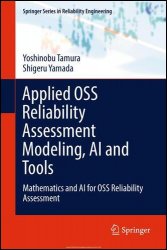Applied OSS Reliability Assessment Modeling, AI and Tools: Mathematics and AI for OSS Reliability Assessment
- Добавил: literator
- Дата: 27-09-2024, 11:00
- Комментариев: 0
 Название: Applied OSS Reliability Assessment Modeling, AI and Tools: Mathematics and AI for OSS Reliability Assessment
Название: Applied OSS Reliability Assessment Modeling, AI and Tools: Mathematics and AI for OSS Reliability AssessmentАвтор: Yoshinobu Tamura, Shigeru Yamada
Издательство: Springer
Год: 2024
Страниц: 191
Язык: английский
Формат: pdf (true), epub
Размер: 32.2 MB
This textbook introduces the theory and application of open source software (OSS) reliability.
The measurement and management of open source software are essential to produce and maintain quality and reliable systems while using open source software. This book describes the latest methods for the reliability assessment of open source software. This book will serve as a textbook and reference book for graduate students and researchers in reliability for open source software, modeling, and Deep Learning. Several latest methods of reliability assessment for open source software are introduced. We aim to present the state-of-the-art of open source software reliability measurement and assessment based on the stochastic modeling and Deep Learning approaches. For example, stochastic differential equation models, two dimensional stochastic differential equation models, Deep Learning methods, tools are presented.
- Introduces the theory and application of open course software (OSS) reliability
- Includes stochastic modeling and Deep Learning approaches
- Useful to university students, IT professionals, and professors
Chapter 1 introduces several aspects of software reliability, open source software development paradigm, and its applications. Also, the basic concept of mathematical modeling based on probability theory and statistics required to describe the software fault-detection phenomena or the software failure-occurrence phenomena and estimate the software reliability quantitatively is introduced.
Chapter 2 describe the basic concept of stochastic differential equation modeling. Chapter 3 introduces two dimensional stochastic differential equation models. Chapter 4 is the jump diffusion process model as an application of the stochastic differential equation modeling for OSS reliability analysis.
Chapters 5 and 6 describe the methods of cyclically two dimensional stochastic differential equation modeling and cyclically two dimensional jump diffusion process modeling considering the edge OSS computing environment. Chapter 7 shows several numerical examples based on the developed software tool.
Chapters 8, 9 and 10 provide several Deep Learningg approaches by using the OSS fault big data sets. In particular, the Wiener process and jump diffusion process are used for data preprocessing as a new approach. Moreover, several numerical examples for the proposed methods of OSS reliability assessment are based on several actual data sets recorded in the bug tracking systems for open source projects. The proposed method will be helpful to assess the OSS reliability. Chapter 11 shows that the tool will be useful for software managers and engineers to assess the reliability of open source software by applying the Deep Learning.
The book contains exercises to aid learning and is useful for graduate students and researchers.
Скачать Applied OSS Reliability Assessment Modeling, AI and Tools: Mathematics and AI for OSS Reliability Assessment
Внимание
Уважаемый посетитель, Вы зашли на сайт как незарегистрированный пользователь.
Мы рекомендуем Вам зарегистрироваться либо войти на сайт под своим именем.
Уважаемый посетитель, Вы зашли на сайт как незарегистрированный пользователь.
Мы рекомендуем Вам зарегистрироваться либо войти на сайт под своим именем.
Информация
Посетители, находящиеся в группе Гости, не могут оставлять комментарии к данной публикации.
Посетители, находящиеся в группе Гости, не могут оставлять комментарии к данной публикации.
